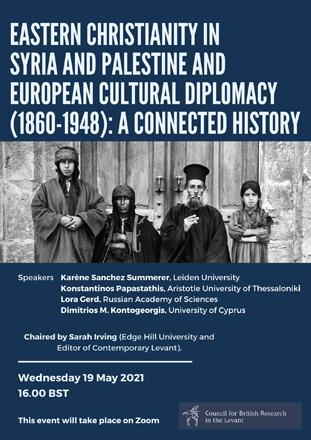- Local News
- Sun-2021-05-23 | 01:57 pm

Nayrouz News Agency :
A webinar organised by the Council of the British Research in the Levant last Wednesday discussed European cultural diplomacy in Syria and Palestine during the Ottoman and British/French Mandate periods and how it impacted Arab Christians.
"Our intention was to tell the story of Palestine and Syria in transition from the Ottoman to Mandate periods,” said Karene Sanchez Summerer, an associate professor at Leiden University, during the webinar titled "Eastern Christianity in Syria and Palestine and European Cultural Diplomacy [1860-1948]: A Connected History”.
Scholars wanted to show that this cultural approach included appropriation, domination and cooperation in Palestine and Syria, Summerer underlined, adding that local archives were underrepresented due to a problem to access them.
The idea behind the CrossRoads project — which aims to revisit the relationship between the European cultural agenda and the local identity formation process of Arab Christian communities in Palestine — was to offer a key to local events and history, Summerer said, noting that "we had to understand the exchange of influence between different communities”.
"It is intended to shed light on modes of interaction and influence, between Arab Christians and other social groups in Palestine and European actors,” Summerer said.
Talking about the Russian involvement with Christian centres in the holy land, Lora Gerd from St Petersburg Institute of History said that the Russian Empire became active in the1830s.
The Palestine society created a network of schools where around 10,000 children studied until the beginning of WW 1, Gerd said.
"In the 19th century, holy land became a centre of concurrence between the European great powers and an important object of the so-called Eastern Question [the issue of political and economic crisis within the Ottoman Empire from the late 18th century to early 20th century],” Gerd elaborated.
The first attempt to gather systematic information about the Orthodox Church in the Middle East was made in the early 1840s, when the learned archimandrite Porphyrii Uspenskii was delegated from the Russian Empire to the holy land, according to Gerd.
In 1847, Uspenskii was sent to Jerusalem as head of the first Russian ecclesiastical mission and his participation in the reorganisation of the Holy Cross School. The starting of an Arab typography can be regarded as the main result of cultural diplomacy in this period, Gerd emphasised.
Assistant Professor Konstantinos Papastathis at the Department of Political Science at Aristotle University of Thessaloniki highlighted the history of the Greek community of Jerusalem in the late Ottoman times and the formative years of the British Mandate.
"In my paper I focus on the creation of the Greek Colony, with the so-called Greek Club at its centre, as well as the role of Greek cultural diplomacy in its development,” Papastathis said, adding that he tried to highlight the relationships between the Greek state, the Orthodox Patriarchate and the establishment and development of the Jerusalem Greek diaspora.
The Orthodox community under the Jerusalem patriarch did not imply a national grouping but a congregational one as the majority of Orthodox Christians were been ethnic Arabs closely associated with the Palestinian national cause and exercising a strong bond with the Arab Muslim community, Papastathis explained, adding that the common religious identity did not work as the cohesive element of the group.









